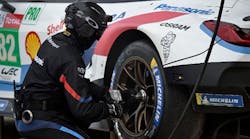Latest from Lighting
Sponsored
Driving in a 24-hour car race is among the more grueling sporting events -- weather is unpredictable and the pace of the cars can exceed over 200 mph. When darkness comes, the drivers don’t slow down.
Osram, Munich, Germany, has been working with the BMW M Motorsport team to employed an innovative tool, human-centric lighting, to maintain endurance levels during key racing events. At the recent 24 Hours of Le Mans race, the technology was again put to the test.
Human-centric lighting is a form of biomimicry – an approach to solving problems by emulating nature’s patterns and strategies, Osram said in a recent case study on its work in the race. Human-centric lighting applies light characteristics such as color, intensity and timing to artificial lighting to mimic natural light.
Osram said it has been providing human-centric lighting technology to racing drivers and their teams since last year’s season when it premiered its biologically-effective light in cooperation with BMW Motorsport the Nürburgring 24 Hours. At the recent running of the legendary 24 Hours of Le Mans race, the BMW M Motorsport team once again had the support of Osram.
Le Mans, on the fabled Circuit de la Sarthe raceway, is considered the most important race in the FIA World Endurance Championship. Held in June when days are the longest, the race still requires eight hours of treacherous night driving.
One gadget used by the BMW Motorsport team to prepare for exhausting race laps are HCL glasses developed by Osram. They are designed to mobilize the energy exactly when needed and help sharpen the focus, e.g. during the arduous 24-hour race. The blue LED light prepares for the battle ahead by stimulating the central nervous system. In the common rooms and the pit wall control center special luminaires were installed for the benefit of the drivers and the engineers. The luminaires emit light with a high blue component, helping to heighten and maintain concentration levels even during the night session, Osram said in the release.


